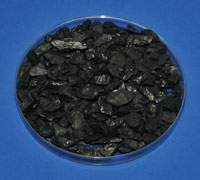It has been known for quite some time that vitamins affect the skin. If your diet doesn't contain enough of the various vitamins then your skin is likely to be dry, blotchy, and unhealthy looking. So if you want to take really good care of your skin then it helps if you have an understanding of the role that vitamins play in healthy skin.
Vitamins are able to act both on the surface of the skin in skin care products, and internally through our diet and basically they can help protect the skin from damage, help the skin to heal itself should damage occur, and can help to remove toxins.
Vitamin E
Vitamin E is the name that is used to describe several different Tocopherols. Tocopherols are powerful antioxidants that can protect the body and the skin from the harmful rays of the sun as well as other toxins by removing free radicals from the body. Free radicals are formed when pollutants start to break down or when oils oxidise after being exposed to heat and the sun.
There are two main uses for Vitamin E as far as skincare products are concerned. Vitamin E can be used as an antioxidant to keep the product fresh, particularly if oils such as hemp seed, evening primrose or borage oil are used as these oils can all go rancid very quickly.
Vitamin E can also be added to a product to help to prevent aging of the skin. It removes the free radicals in the skin, in doing so it helps to prevent wrinkles and at the same time will stimulate the blood circulation and will help the skin to maintain elasticity.
The highest natural source of vitamin E is found in vegetable oils, particularly wheat germ oil, sunflower oil, almond oil, hazelnut oil, walnut oil and olive oil, and in soy beans.
Vitamin C
Vitamin C (ascorbic acid) is widely used in skin care. It is also a powerful antioxidant like Vitamin E and can help repair skin damage caused by exposure to the sun and can rejuvenate the skin so you will often find Vitamin C in skincare products.
Vitamin C also helps produce collagen, which is necessary for healthy skin and can make the skin appear younger. The richest source of vitamin C is in citrus fruits and in vegetables.
Vitamin A
Vitamin A is a fat soluble vitamin that can build up inside the body over time and if too much is consumed you can easily exceed the recommended daily allowance which can lead to a condition known as vitamin toxicity. However, you are only likely to consume too much vitamin A if you take vitamin A supplements or Cod Liver Oil on a regular basis and not from a balanced diet. If you don't get enough vitamin A your skin is likely to be dry and rough. Vitamin A has huge benefits for the skin as it has antioxidant properties and can help to improve the appearance of the skin and make fine lines and wrinkles less visible. The active ingredient is the Retinoids in Vitamin A but some people can react to Vitamin A and experience reddening or stinging of the skin but in most everyday skincare products the amounts are too low.
You can find Vitamin A in foods that include chicken, beef, turkey and fish liver, carrots, broccoli, sweet potato, butter, spinach, pumpkin, dairy products, melon, and apricot and mango fruit.
Vitamin Bs
The B group of vitamins help the skin to retain moisture, and keep the skin looking smooth, radiant and healthy. You can find Vitamin B in meat and fish products, as well as bananas, lentils, beans and any whole foods. Vitamin B is a relative newcomer to skincare products. Vitamin K
Vitamin K is often found products that will claim to help remove dark circles under the eyes. It can also help to repair broken capillaries.
You can find vitamin K in leafy green vegetables, brassicas such as cauliflower and broccoli, as well as in avocado, kiwi fruit and soybean oil.
Vitamin D
Vitamin D is formed on the skin when the sun's rays interact with the skin. It is also a fat soluble vitamin like Vitamin A and as such can build up to toxic levels but only when taken as a supplement. You won't overdose on vitamin D by exposure to sunshine.
Vitamin D has antioxidant properties and is also anti-carcinogenic which means it could play a role in helping to prevent skin cancer as well as other cancers.
Now here's the dilemma, we are told that exposure to the sun is the number one cause of premature ageing, and at the same time we need some exposure in order to get the benefit of vitamin D. The answer as always lies in balance. Don't stay out in the hot midday sun baking away without a sunscreen, but do get a morning walk in the sunshine when the sun is not so strong. It's common sense really.

 How to Maintain Your Aquarium Filter
Aquarium filtration saw monumental advances in technology du
How to Maintain Your Aquarium Filter
Aquarium filtration saw monumental advances in technology du
 Aquarium Carbon
Whether it is for a small betta bowl, 6 million gallons
Aquarium Carbon
Whether it is for a small betta bowl, 6 million gallons
 Canister Filters
In this article we will deal with a type of filter that many
Canister Filters
In this article we will deal with a type of filter that many
 Aquarium Filtration Done Right
Today, keeping unique aquatic species is now commonplace tha
Aquarium Filtration Done Right
Today, keeping unique aquatic species is now commonplace tha
 Marine Nano Tank Problems
Marine Nano Tank Problems